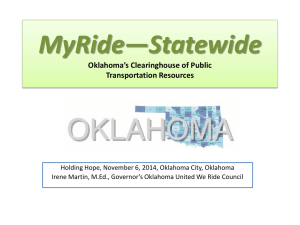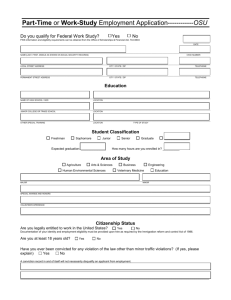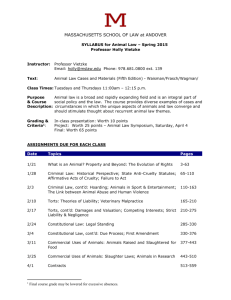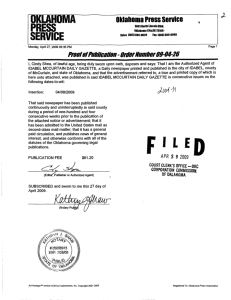An Act - Steve Kunzweiler, Tulsa County District Attorney
advertisement
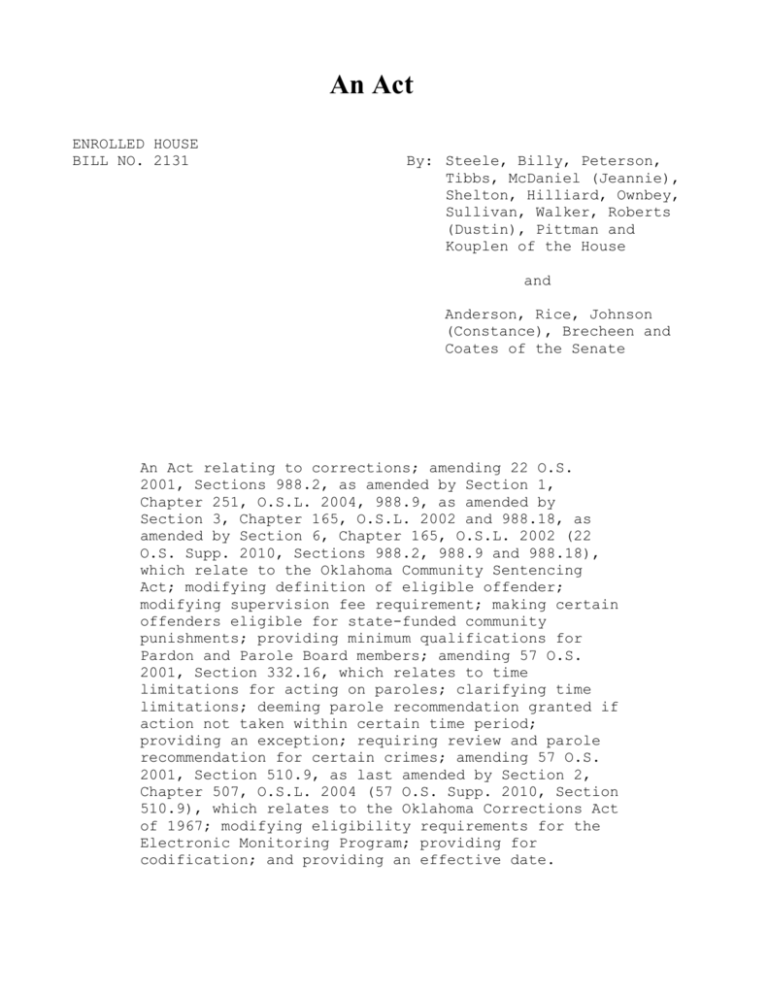
An Act ENROLLED HOUSE BILL NO. 2131 By: Steele, Billy, Peterson, Tibbs, McDaniel (Jeannie), Shelton, Hilliard, Ownbey, Sullivan, Walker, Roberts (Dustin), Pittman and Kouplen of the House and Anderson, Rice, Johnson (Constance), Brecheen and Coates of the Senate An Act relating to corrections; amending 22 O.S. 2001, Sections 988.2, as amended by Section 1, Chapter 251, O.S.L. 2004, 988.9, as amended by Section 3, Chapter 165, O.S.L. 2002 and 988.18, as amended by Section 6, Chapter 165, O.S.L. 2002 (22 O.S. Supp. 2010, Sections 988.2, 988.9 and 988.18), which relate to the Oklahoma Community Sentencing Act; modifying definition of eligible offender; modifying supervision fee requirement; making certain offenders eligible for state-funded community punishments; providing minimum qualifications for Pardon and Parole Board members; amending 57 O.S. 2001, Section 332.16, which relates to time limitations for acting on paroles; clarifying time limitations; deeming parole recommendation granted if action not taken within certain time period; providing an exception; requiring review and parole recommendation for certain crimes; amending 57 O.S. 2001, Section 510.9, as last amended by Section 2, Chapter 507, O.S.L. 2004 (57 O.S. Supp. 2010, Section 510.9), which relates to the Oklahoma Corrections Act of 1967; modifying eligibility requirements for the Electronic Monitoring Program; providing for codification; and providing an effective date. SUBJECT: Corrections BE IT ENACTED BY THE PEOPLE OF THE STATE OF OKLAHOMA: SECTION 1. AMENDATORY 22 O.S. 2001, Section 988.2, as amended by Section 1, Chapter 251, O.S.L. 2004 (22 O.S. Supp. 2010, Section 988.2), is amended to read as follows: Section 988.2 Sentencing Act: A. For purposes of the Oklahoma Community 1. “Local community sentencing system” means a partnership between the state and one or more county governments which uses public and private entities to deliver services to the sentencing court for punishment of eligible felony offenders under the authority of a community sentence; 2. “Community sentence” or “community punishment” means a punishment imposed by the court as a condition of a deferred or suspended sentence for an eligible offender; 3. “Continuum of sanctions” means a variety of coercive measures and treatment options ranked by degrees of public safety, punitive effect, and cost benefit which are available to the sentencing judge as punishment for criminal conduct; 4. “Community sentencing system planning council” or “planning council” means a group of citizens and elected officials specified by law or appointed by the Chief Judge of the Judicial District which plans the local community sentencing system and with the assistance of the Community Sentencing Division of the Department of Corrections locates treatment providers and resources to support the local community sentencing system; 5. “Incentive” means a court-ordered reduction in the terms or conditions of a community sentence which is given for exceptional performance or progress by the offender; 6. “Disciplinary sanction” means a court-ordered punishment in response to a technical or noncompliance violation of a community sentence which increases in intensity or duration with each successive violation; 7. “Division” means the Community Sentencing Division within the Department of Corrections which is the state administration ENR. H. B. NO. 2131 Page 2 agency for the Oklahoma Community Sentencing Act, the statewide community sentencing system, and all local community sentencing systems; 8. “Eligible offender” means a felony offender who has been convicted of or who has entered a plea other than not guilty to a felony offense and who upon completion of a Level of Services Inventory or another assessment instrument has been found to be in the moderate a range other than the low range, who has been convicted of at least one prior felony, and who is not otherwise prohibited by law; provided, however, that no person who has been convicted of or who has entered a plea other than not guilty to an offense enumerated in subsection 5 of Section 571 of Title 57 of the Oklahoma Statutes, as an exception to the definition of “nonviolent offense” shall be eligible for a community sentence or community punishment unless the district attorney or an assistant district attorney for the district in which the offender’s conviction was obtained consents thereto. The district attorney may consent to eligibility for an offender who has a mental illness or a developmental disability or a co-occurring mental illness and substance abuse disorder and who scores outside in the moderate low range on the LSI or another assessment instrument if the offender is not otherwise prohibited by law. Any consent by a district attorney shall be made a part of the record of the case. Provided, further, that no person who has been convicted of or who has entered a plea other than not guilty to a felony enumerated in Section 13.1 of Title 21 of the Oklahoma Statutes shall be eligible for a community sentence or community punishment; and 9. “Statewide community sentencing system” means a network of all counties through their respective local community sentencing systems serving the state judicial system and offering support services to each other through reciprocal and interlocal agreements and interagency cooperation. B. For the purposes of the Oklahoma Community Sentencing Act, if a judicial district does not have a Chief Judge or if a judicial district has more than one Chief Judge, the duties of the Chief Judge provided for in the Oklahoma Community Sentencing Act shall be performed by the Presiding Judge of the Judicial Administrative District. SECTION 2. AMENDATORY 22 O.S. 2001, Section 988.9, as amended by Section 3, Chapter 165, O.S.L. 2002 (22 O.S. Supp. 2010, Section 988.9), is amended to read as follows: ENR. H. B. NO. 2131 Page 3 Section 988.9 A. Any offender sentenced to a community sentence pursuant to the Oklahoma Community Sentencing Act which requires supervision shall be required to pay a supervision fee. The supervising agency shall establish the fee amount, not to exceed Forty Dollars ($40.00) per month, based upon the offender's ability to pay. In hardship cases the supervising agency may expressly waive all or part of the fee. No supervising agency participating in a local community sentencing system shall deny any offender supervision services for the sole reason that the offender is indigent. Fees collected for supervision services performed by the Department of Corrections shall be paid directly to the Department to be deposited in the Department of Corrections Revolving Fund. Supervision services performed by agencies other than the Department shall be paid directly to that agency. B. In addition to any supervision fee, offenders scoring in the moderate a range other than the low range of the Level of Services Inventory (LSI) and participating in a local community sentencing system under a court-ordered community punishment shall be required to pay an administrative fee to support the local system which shall not exceed Twenty Dollars ($20.00) per month to be set by the court. Administrative fees when collected shall be deposited with the Community Sentencing Division within the Department of Corrections and credited to the local community sentencing system for support and expansion of the local community corrections system. In the event the court fails to order the amount of the administrative fee, the fee shall be Twenty Dollars ($20.00) per month. C. In addition to any supervision fee and administrative fee authorized by this section, the court shall assess court costs, and may assess program reimbursement costs, restitution, and fines to be paid by the offender. With the exception of supervision fees, other fees, costs, fines, restitution, or monetary obligations ordered to be paid by the offender shall not cease with the termination of active supervision and such obligations shall continue until fully paid and may be collected in the same manner as court costs. SECTION 3. AMENDATORY 22 O.S. 2001, Section 988.18, as amended by Section 6, Chapter 165, O.S.L. 2002 (22 O.S. Supp. 2010, Section 988.18), is amended to read as follows: Section 988.18 A. On and after March 1, 2000, for each felony offender considered for any community punishment pursuant to the Oklahoma Community Sentencing Act, the judge shall, prior to ENR. H. B. NO. 2131 Page 4 sentencing, order an assessment and evaluation of the defendant as required by law. B. The Level of Services Inventory (LSI), or another assessment and evaluation instrument designed to predict risk to recidivate approved by the Department of Corrections, shall be required to determine eligibility for any offender sentenced pursuant to the Oklahoma Community Sentencing Act. The completed assessment accompanied by a written supervision plan shall be presented to and reviewed by the court prior to determining any punishment for the offense. The purpose of the assessment shall be to identify the extent of the defendant's deficiencies and pro-social needs of the defendant, the potential risk to commit additional offenses that threaten public safety, and the appropriateness of various community punishments. C. Upon order of the court, the defendant shall be required to submit to the LSI or other approved assessment which shall be administered and scored by an appropriately trained person pursuant to a service agreement with the local community sentencing system. Any defendant lacking sufficient skills to comprehend or otherwise participate in the assessment and evaluation shall have appropriate assistance. If it is determined that the offender cannot be adequately evaluated using the LSI or another approved assessment, the offender shall be deemed ineligible for any community services pursuant to the Oklahoma Community Sentencing Act, and shall be sentenced as prescribed by law for the offense. D. The willful failure or refusal of the defendant to be assessed and evaluated by using the LSI or another approved assessment shall preclude the defendant from eligibility for any community punishment. E. The completed LSI, or other approved assessment, shall include a written supervision plan and identify an appropriate community punishment, if any, when the offender is considered eligible for community punishments based upon the offender’s completed risk/need score from the LSI assessment of the offender. Any offender Unless otherwise prohibited by law, only offenders scoring outside the moderate in a range other than the low range on the LSI assessment and having at least one prior felony conviction shall not be eligible for any state-funded community punishments. F. The court is not required to sentence any offender to a community punishment regardless of an eligible score on the LSI. ENR. H. B. NO. 2131 Page 5 Any felony offender scoring in the low risk/need levels on the LSI may be sentenced to a suspended sentence with minimal, if any, conditions of the sentence to be paid by the offender. If the LSI or another assessment has been conducted, the evaluation report shall accompany the judgment and sentence. SECTION 4. NEW LAW A new section of law to be codified in the Oklahoma Statutes as Section 332.1B of Title 57, unless there is created a duplication in numbering, reads as follows: To be eligible for appointment as a Pardon and Parole Board member, a person shall possess at least one of the following minimum qualifications: 1. A bachelor’s degree in the social sciences from an accredited college or university and five (5) years of experience in the criminal justice field; 2. A master’s degree and four (4) years of experience in the criminal justice field; or 3. A juris doctorate and three (3) years of experience in the criminal justice field. SECTION 5. AMENDATORY amended to read as follows: 57 O.S. 2001, Section 332.16, is Section 332.16 A. No recommendation to the Governor for parole shall remain under consideration and in the possession of that office for a time longer than thirty (30) consecutive calendar days. Except as provided for in subsection B of this section, if upon expiration of the thirty-day time period no action is taken by the Governor to grant or deny parole, the recommendation for parole shall be deemed granted. B. The Governor shall be required to review each parole recommendation and shall grant or deny parole for persons convicted of the following crimes: 1. Assault, battery, or assault and battery with a dangerous or deadly weapon as provided in Sections 645 and 652 of Title 21 of the Oklahoma Statutes; 2. Aggravated assault and battery on a police officer, sheriff, highway patrolman, or any other officer of the law as provided in ENR. H. B. NO. 2131 Page 6 Sections 650, 650.2, 650.5, 650.6 and 650.7 of Title 21 of the Oklahoma Statutes; 3. Poisoning with intent to kill as provided in Section 651 of Title 21 of the Oklahoma Statutes; 4. Shooting with intent to kill as provided in Section 652 of Title 21 of the Oklahoma Statutes; 5. Assault with intent to kill as provided in Section 653 of Title 21 of the Oklahoma Statutes; 6. Assault with intent to commit a felony as provided in Section 681 of Title 21 of the Oklahoma Statutes; 7. Assaults while masked or disguised as provided in Section 1303 of Title 21 of the Oklahoma Statutes; 8. Murder in the first degree as provided in Section 701.7 of Title 21 of the Oklahoma Statutes; 9. Murder in the second degree as provided in Section 701.8 of Title 21 of the Oklahoma Statutes; 10. Manslaughter in the first degree as provided in Sections 711, 712 and 714 of Title 21 of the Oklahoma Statutes; 11. Manslaughter in the second degree as provided in Sections 716 and 717 of Title 21 of the Oklahoma Statutes; 12. Kidnapping as provided in Section 741 of Title 21 of the Oklahoma Statutes; 13. Burglary in the first degree as provided in Section 1431 of Title 21 of the Oklahoma Statutes; 14. Burglary with explosives as provided in Section 1441 of Title 21 of the Oklahoma Statutes; 15. Kidnapping for extortion as provided in Section 745 of Title 21 of the Oklahoma Statutes; 16. Maiming as provided in Section 751 of Title 21 of the Oklahoma Statutes; ENR. H. B. NO. 2131 Page 7 17. Robbery as provided in Section 791 of Title 21 of the Oklahoma Statutes; 18. Robbery in the first degree as provided in Section 797 of Title 21 of the Oklahoma Statutes; 19. Robbery in the second degree as provided in Section 797 of Title 21 of the Oklahoma Statutes; 20. Robbery by two or more persons as provided in Section 800 of Title 21 of the Oklahoma Statutes; 21. Robbery with dangerous weapon or imitation firearm as provided in Section 801 of Title 21 of the Oklahoma Statutes; 22. Child abuse as provided in Section 843.5 of Title 21 of the Oklahoma Statutes; 23. Wiring any equipment, vehicle or structure with explosives as provided in Section 849 of Title 21 of the Oklahoma Statutes; 24. Forcible sodomy as provided in Section 888 of Title 21 of the Oklahoma Statutes; 25. Rape in the first degree as provided in Sections 1111 and 1114 of Title 21 of the Oklahoma Statutes; 26. Rape in the second degree as provided in Sections 1111 and 1114 of Title 21 of the Oklahoma Statutes; 27. Rape by instrumentation as provided in Section 1111.1 of Title 21 of the Oklahoma Statutes; 28. Lewd or indecent proposition or lewd or indecent act with a child as provided in Section 1123 of Title 21 of the Oklahoma Statutes; 29. Use of a firearm or offensive weapon to commit or attempt to commit a felony as provided in Section 1287 of Title 21 of the Oklahoma Statutes; 30. Pointing firearms as provided in Section 1289.16 of Title 21 of the Oklahoma Statutes; ENR. H. B. NO. 2131 Page 8 31. Rioting as provided in Sections 1311 and 1321.8 of Title 21 of the Oklahoma Statutes; 32. Inciting to riot as provided in Section 1320.2 of Title 21 of the Oklahoma Statutes; 33. Arson in the first degree as provided in Section 1401 of Title 21 of the Oklahoma Statutes; 34. Injuring or burning public buildings as provided in Section 349 of Title 21 of the Oklahoma Statutes; 35. Sabotage as provided in Sections 1262, 1265.4 and 1265.5 of Title 21 of the Oklahoma Statutes; 36. Criminal syndicalism as provided in Section 1261 of Title 21 of the Oklahoma Statutes; 37. Extortion as provided in Sections 1481 and 1486 of Title 21 of the Oklahoma Statutes; 38. Obtaining signature by extortion as provided in Section 1485 of Title 21 of the Oklahoma Statutes; 39. Seizure of a bus, discharging firearm or hurling missile at bus as provided in Section 1903 of Title 21 of the Oklahoma Statutes; 40. Mistreatment of a mental patient as provided in Section 843.1 of Title 21 of the Oklahoma Statutes; 41. Using a vehicle to facilitate the discharge of a weapon as provided in Section 652 of Title 21 of the Oklahoma Statutes; 42. Aggravated drug trafficking as provided in Section 2-415 of Title 63 of the Oklahoma Statutes; 43. Racketeering as provided in Section 1403 of Title 22 of the Oklahoma Statutes; 44. Offenses of public corruption such as bribery of public officials as provided in Section 381 or 382 of Title 21 of the Oklahoma Statutes; ENR. H. B. NO. 2131 Page 9 45. Embezzlement of public money as provided in Section 1451 et seq. of Title 21 or Section 641 of Title 19 of the Oklahoma Statutes; 46. Failure to pay and collect tax as provided in Section 1361 or 2385.3 of Title 68 of the Oklahoma Statutes; 47. Conspiracy to defraud the state as provided in Section 424 of Title 21 of the Oklahoma Statutes; 48. Child pornography as provided in Section 1021.2 or 1021.3 or defined in Section 1024.1 of Title 21 of the Oklahoma Statutes; 49. Child prostitution as defined by Section 1030 of Title 21 of the Oklahoma Statutes; 50. Abuse of a vulnerable adult as defined in Section 10-103 of Title 43A of the Oklahoma Statutes; 51. Terrorism crimes, including biochemical assault as provided in Section 1268 of Title 21 of the Oklahoma Statutes; 52. Trafficking of children as provided in Section 865 et seq. of Title 21 of the Oklahoma Statutes; or 53. Trafficking of humans as provided in Section 748 et seq. of Title 21 of the Oklahoma Statutes. C. When the Pardon and Parole Board makes a recommendation for a compassionate parole pursuant to subsection B of Section 332.18 of this title, the Board shall forward all relevant documentation to the Governor within four (4) business days of the parole review of the inmate. Upon receipt, the Governor shall have four (4) business days to grant or deny the compassionate parole. SECTION 6. AMENDATORY 57 O.S. 2001, Section 510.9, as last amended by Section 2, Chapter 507, O.S.L. 2004 (57 O.S. Supp. 2010, Section 510.9), is amended to read as follows: Section 510.9 A. There is hereby created the Electronic Monitoring Program for inmates in the custody of the Department of Corrections who are sentenced for a nonviolent offense as defined by Section 571 of this title. The Department is authorized to use an electronic monitoring global positioning device to satisfy its custody duties and responsibilities. ENR. H. B. NO. 2131 Page 10 B. After an inmate has been processed and received through the Lexington a Department Assessment and Reception Center, has been incarcerated in a secure facility for a minimum of one hundred eighty (180) ninety (90) days, and has met the criteria established in subsection C of Section 521 of this title, the Director of the Department of Corrections may assign the inmate, if eligible, to the Electronic Monitoring Program. Nothing shall prohibit the Director from assigning an inmate to the Electronic Monitoring Program while assigned to the accredited halfway house or transitional living facility. The following inmates, youthful offenders, and juveniles shall not be eligible for assignment to the program: 1. Any inmate who has eleven (11) months or more left on their serving a sentence of more than five (5) years who has eleven (11) months or more left on the sentence or any inmate serving a sentence of five (5) years or less whose initial custody assessment requires placement above the minimum security level; 2. Inmates convicted of a violent offense within the previous ten (10) years; 3. Inmates convicted of any violation of the provisions of the Trafficking in Illegal Drugs Act, Section 2-414 et seq. of Title 63 of the Oklahoma Statutes; 4. Inmates denied parole within the previous twelve (12) months pursuant to Section 332.7 of this title; 5. Inmates convicted pursuant to Section 11-902 of Title 47 of the Oklahoma Statutes who are not receptive to substance abuse treatment and follow-up treatment; 6. Inmates removed from the Electronic Monitoring Program or any other alternative to incarceration authorized by law for violation of any rule or condition of the program and reassigned to imprisonment in a correctional facility; 7. Inmates deemed by the Department to be a security risk or threat to the public; 8. Inmates requiring educational, medical or other services or programs not available in a community setting as determined by the Department; ENR. H. B. NO. 2131 Page 11 9. Inmates convicted of any violation of subsection C of Section 644 of Title 21 of the Oklahoma Statutes or who have an active protection order that was issued under the Protection from Domestic Abuse Act, Sections 60 through 60.16 of Title 22 of the Oklahoma Statutes; 10. Inmates who have outstanding felony warrants or detainers from another jurisdiction; 11. Inmates convicted of a sex offense who, upon release from incarceration, would be required by law to register pursuant to the Sex Offender Registration Act; 12. Inmates convicted of racketeering activity as defined in Section 1402 of Title 22 of the Oklahoma Statutes; 13. Inmates convicted pursuant to subsection F of Section 2-401 of Title 63 of the Oklahoma Statutes; 14. Inmates convicted pursuant to Section 650 of Title 21 of the Oklahoma Statutes; 15. Inmates who have escaped from a penal or correctional institution within the previous ten (10) years; or 16. Inmates who currently have active misconduct actions on file with the Department of Corrections. C. Every eligible inmate assigned to the Electronic Monitoring Program shall remain in such program until one of the following conditions has been met: 1. The inmate discharges the term of the sentence; 2. The inmate is removed from the Electronic Monitoring Program for violation of any rule or condition of the program and reassigned to imprisonment in a correctional facility; or 3. The inmate is paroled by the Governor pursuant to Section 332.7 of this title. D. After an inmate has been assigned to the Electronic Monitoring Program, denial of parole pursuant to Section 332.7 of this title, shall not be cause for removal from the program, provided the inmate has not violated the rules or conditions of the ENR. H. B. NO. 2131 Page 12 program. The inmate may remain assigned to the program, if otherwise eligible, until the completion of the sentence. E. The Electronic Monitoring Program shall require active supervision of the inmate in a community setting by a correctional officer or other employee of the Department of Corrections with monitoring by a global positioning device approved by the Department under such rules and conditions as may be established by the Department. If an inmate violates any rule or condition of the program, the Department may take necessary disciplinary action consistent with the rules established pursuant to this section, including reassignment to a higher level of security or removing the inmate from the program with reassignment to imprisonment in a correctional facility. Any inmate who escapes from the Electronic Monitoring Program shall be subject to the provisions of Section 443 of Title 21 of the Oklahoma Statutes. F. Upon an inmate assigned to the Electronic Monitoring Program becoming eligible for parole consideration, pursuant to Section 332.7 of this title, the Department of Corrections shall deliver the inmate, in person, to a correctional facility for interview, together with any Department records necessary for the Pardon and Parole Board's investigation. Inmates assigned to the Electronic Monitoring Program shall not be allowed to waive consideration or recommendation for parole. G. Prior to placement of any eligible inmate assigned to the Electronic Monitoring Program being placed in a community setting, the Department of Corrections shall deliver a written notification to the sheriff and district attorney of the county, and the chief law enforcement officer of any incorporated city or town in which the inmate is to be monitored and supervised under the program. The district attorney shall disseminate such information to victims of the crime for which the inmate is serving sentence, if any, when the victims are known to live in the same city, town or county. H. An inmate assigned to the Electronic Monitoring Program may be required to pay the Department of Corrections for all or part of any monitoring equipment or fee, substance abuse treatment program or follow-up treatment expense, supervision cost, or other costs while assigned to the program. The Department shall determine whether the inmate has the ability to pay all or part of such fee or costs. ENR. H. B. NO. 2131 Page 13 I. The Department of Corrections shall promulgate and adopt rules and procedures necessary to implement the Electronic Monitoring Program, including but not limited to methods of monitoring and supervision, disciplinary action, reassignment to higher and lower security levels, removal from the program, and costs of monitoring and supervision to be paid by the inmate, if any. SECTION 7. This act shall become effective November 1, 2011. ENR. H. B. NO. 2131 Page 14 Passed the House of Representatives the 5th day of May, 2011. Presiding Officer of the House of Representatives Passed the Senate the 20th day of April, 2011. Presiding Officer of the Senate ENR. H. B. NO. 2131 Page 15


